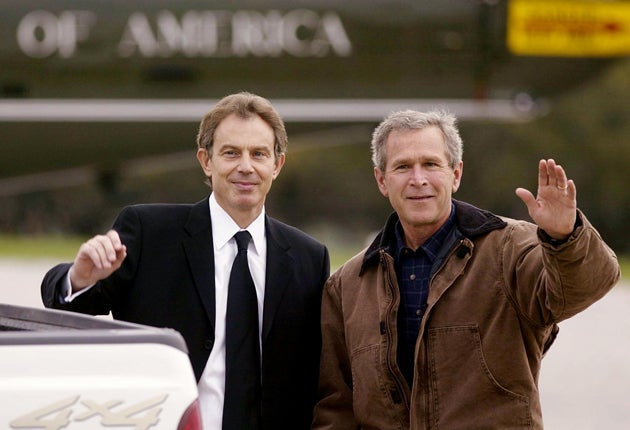UK 'suddenly' let in on Bush war plans
US military leaders opened up after Blair met President at Texas ranch

Britain's military chiefs were suddenly included in top secret US planning for an invasion of Iraq in the months following a private meeting between Tony Blair and President Bush, the Iraq inquiry heard yesterday.
Major-General David Wilson, then Britain's military adviser at US Central Command in Tampa, Florida, said he was given absolutely no access to war planning on Iraq when he arrived at the facility prior to the leaders' meeting in April 2002, saying he "would have been shot" had he attempted to muscle in on the talks. However, US co-operation changed abruptly two months later.
He said the access was a "defining moment" in the lead-up to war as he was "made privy to planning that had gone on to that point by the US". It was at the meeting at the President's ranch in Crawford, Texas, that George Bush revealed to Mr Blair that military options on an Iraq campaign had already been drawn up. Earlier Sir Christopher Meyer, Britain's ambassador to the US at the time, also said that the leaders may have firmed up an agreement on military action during the encounter.
General Wilson said he believed an order had been made by Donald Rumsfeld, then the US Defence Secretary, to "draw back the curtain" and give Britain access to the planning process on Iraq. Military chiefs were told of a five-pronged plan drawn up by General Franks, head of US Central Command.
General Wilson said "secure wires ran hot" between London and Tampa as planners within the MoD learned of the strategy. He then gave a speech to a secret military meeting in the US in August 2002 laying out possible British involvement in a military campaign.
However, he said no decision had been made on committing British troops to any future operation. He added that he was "never put on the spot" by US military planners about Britain's willingness to participate in the invasion.
The inquiry was told by another senior military figure that he set up a small "scoping" group within the MoD to look at possible military options for Iraq upon Mr Blair's return from Crawford. "My job was to bring options," said Sir Anthony Pigott, the former Deputy Chief of the Defence Staff. "There was no talk about plans at that stage."
General Wilson also attacked US planning for the reconstruction of Iraq, adding that he had warned repeatedly that not enough was being done in preparation for the war's aftermath. He said that the Office for Reconstruction and Humanitarian Assistance, set up to oversee the reconstruction effort, had been unfunded and understaffed.
Meanwhile, Britain's former ambassador in Baghdad left Gordon Brown with questions to answer after saying that Mr Brown, then the Chancellor, refused to provide extra funds needed in 2006 to restore normality to the city of Basra. Dominic Asquith said that the Treasury refused requests for an extra £13m to help reconstruction efforts. Political tensions were so great in the years following the invasion that Iraqi politicians told him that only the heavy presence of international troops stopped the newly formed government in Baghdad from being toppled.
Iraq inquiry: What we have learnt
*Monday: Nine months before the invasion, Tony Blair asked military chiefs to draw up war plans for Iraq. Sir David Manning, Mr Blair's foreign policy adviser, revealed that President Bush and Mr Blair discussed Saddam Hussein and Iraq just three days after the 9/11 terror attacks.
*Tuesday: British reconstruction efforts in Iraq after the 2003 invasion were hampered by funding and staff shortages, senior Foreign Office officials said. The inquiry heard that the demands of the task outstripped the money provided by the Government.
*Thursday: Admiral Lord Boyce, then the Chief of the Defence Staff, said that Geoff Hoon, then Defence Secretary, blocked him from ordering equipment and mobilising troops for several months because ministers did not want the secret plans to become public.
Join our commenting forum
Join thought-provoking conversations, follow other Independent readers and see their replies
Comments
Bookmark popover
Removed from bookmarks